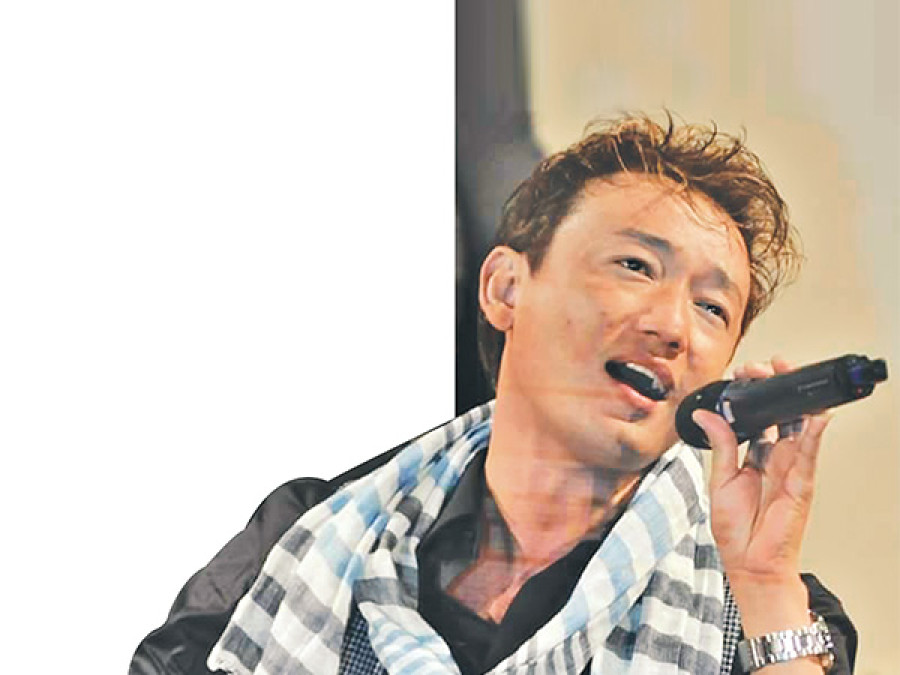Entertainment
Along the long and winding road
Born to an impoverished family in Sunsari, Limbu sublimated his grief into music and made it big
Timothy Aryal
Limbu was determined to give it his best and come across well in front of the judges in order to pave his way forward—to continue doing what he loves to do the most. Limbu climbed up the stage and sang the classic Aaja Bholi Harek Saajh, by Narayan Gopal. Impressed with the young man’s talent, the judges (Deepak Jangam, Bimala Rai and Alok Shree) decided to send Limbu to the next round. He eventually went on to win the whole competition.
‘’It was of course a fabulous achievement for me. It marked as a milestone in my singing career,’’ he says. But the road to the triumph had not been easy.
When Limbu was a kid, Dharan had still not been introduced to the technological advancements that had already made their way into Kathmandu. In the late 90s, Limbu’s early teenage years, radio was still the primary source of music in Dharan. ‘’Whenever I happened to hear my favourite music, I would rush towards the radio to crank it to the fullest volume possible and would note down the lyrics, which I would later hum to myself. That was what would provide me the gratification I would always be craving for,’’ Limbu recalls his childhood. ‘’Songs by artists like Narayan Gopal, Fatteman Rajbhandari, Aruna Lama and Deep Shrestha were the staples back then. They are the ones, I would say, that instilled the sense of music in me. I still look up to these artists for inspiration.’’ The young Limbu had already gotten a sense of what he loved to do the most. Yet, devoting his time fully to music was not possible.
Limbu was born to an impoverished family in Prakashpur Village, Sunsari. The family of eight had to work hard to make ends meet. He lost his father at the age of nine. To add to the misery, he lost his mother too, just three months after his father’s death. Limbu certainly saw more than his share of misery. But even amidst all this, Limbu decided to make a career in music, which never seemed a secure enough sector to eke out a living. Of course, his family had not imagined Limbu would sublimate his grief into music, and make it big one day.
When still in his early teens, Limbu had already become popular as a singer among his peers. He was a regular performer at school functions, and by the time Limbu passed his SLC, he had already established himself as a popular singer in Dharan (where he, along with his siblings, had migrated to from Prakashpur). “Whenever there was a music programme in the city, I would not miss a chance to perform; performing in front of the crowd was one of my favourite things,” recalls the singer.
After he won the Nepali Tara competition, he released his first album. Fueled by songs like Ma ta Hajur and Maya Nagarne Hoina, the album— titled Nepali Tara Dipak Limbu—was a hit. “ I was overwhelmed by the audience’s reaction to my first album. It inspired me to delve deeper into music,” says Limbu.
Although Limbu is more comfortable singing adhunik songs, he has also explored other genres as well; he has even sung some patriotic numbers, Yaha Desha Ko chha chinta being one of them.
Limbu has so far put out three albums of adhunik songs, all of which have been received well. Shrabya, the latest, was released a month ago. All the ten songs in the album are based on the classic adunik structure. The album has been doing well, Limbu says.
Limbu has also lent his voice to several Nepali movies. He has so far sung for more than 300 songs in movies, many of them blockbusters, including numbers like Magera Paune Bhaye Ma, Maile tei Bhayera Mann Paraako, and Dhalkyo Dhalkyo.
Limbu has probably been so successful because his songs have what it takes to attract the mainstream audience’s attention. You don’t have to work hard to get Limbu’s songs. With catchy rhythms and light, yet penetrating, lyrics, infused with romantic sensibilities, all encased in a soothing voice, his songs are very easy on the ear.
Limbu likes to credit the success of his songs to the men he has worked with.
‘’I have always had the opportunity to work with talented musicians and composers. I feel very lucky,’’ he says.




 11.12°C Kathmandu
11.12°C Kathmandu










